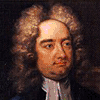
Tilting at Windmills: Cervantes and the Modern Satirical Novel
Don Quixote looms large in our cultural consciousness; most people are familiar with the phrase 'tilting at windmills', indicating a futile activity. But at the time Miguel Cervantes published the story of the dutiful knight with a sadly feeble grip on reality it was not a simple comedy, but rather a searing satire that put an end, once and for all, to the doggedly enduring pretenses of the chivalric world. Cervantes (1547-1616) was a contemporary of Shakespeare, a tax collector who endured a stint in prison for financial difficulties. He lived in a dramatically different world from that of the middle ages - the insular world of King Arthur's wandering knights and their ilk was a distant cultural memory. While now such images are recognizably stock elements of fantasy, completely divorced from any reality, in Cervantes' day the mythos was still linked to the nobility, however tenuously. The protagonist Alonso Quijano, a minor nobleman who reads one too many chivalric romances, is painfully aware of this link. He develops the persona of Don Quixote as a desperate means of escaping his stiflingly modest and decidedly unremarkable life.
The story of Don Quixote is so powerful because it juxtaposes the idealism of the wishful knight with the extremely mundane. Even the language of the book reflected everyday speech, which was most unusual for the literature of the day and which underscored the archaic quality of Quixote's speech. Remarkably, the most enduring accomplishment Quijano accomplishes as Don Quixote, within the story, is to inspire a book about his mad exploits, a feat that the aged gentleman openly regrets upon his deathbed. This denial, however, of his own legend is a curiously pointed end to the tale; Cervantes clearly wished there to be no ambiguity about the folly of Don Quixote's deeds.
The following excerpt is from Don Quixote's defining duel against the windmills. His sidekick Sancho, of course, sees the truth clearly the whole time.
Excerpt from Miguel Cervantes: The Ingenious Hidalgo Don Quixote of La Mancha (1605)
At this point they came in sight of thirty or forty windmills on the plain, and as soon as Don Quixote saw them he said to his squire, "Fortune is arranging matters for us better than we could have shaped our desires ourselves, for look there, friend Sancho Panza, where thirty or more monstrous giants present themselves, all of whom I mean to engage in battle and slay, and with whose spoils we shall begin to make our fortunes; for this is righteous warfare, and it is God's good service to sweep so evil a breed from off the face of the earth."
"What giants?" said Sancho Panza.
"Those thou seest there," answered his master, "with the long arms, and some have them nearly two leagues long."
"Look, your worship," said Sancho; "what we see there are not giants but windmills, and what seem to be their arms are the sails that turned by the wind make the millstone go."
"It is easy to see," replied Don Quixote, "that thou art not used to this business of adventures. Those are giants; and if thou art afraid, away with thee out of this and betake thyself to prayer while I engage them in fierce and unequal combat."
...A slight breeze at this moment sprang up, and the great sails began to move, seeing which Don Quixote exclaimed, "Though ye flourish more arms than the giant Briareus, ye have to reckon with me."
So saying, and commending himself with all his heart to his lady Dulcinea, imploring her to support him in such a peril, with lance in rest and covered by his buckler, he charged at Rocinante's fullest gallop and fell upon the first mill that stood in front of him; but as he drove his lance-point into the sail the wind whirled it round with such force that it shivered the lance to pieces, sweeping with it horse and rider, who went rolling over on the plain, in a sorry condition.
..."God bless me!" said Sancho, "didn't I tell your worship to be careful? They're only windmills..."
"Hush, friend Sancho," replied Don Quixote, "the fortunes of war more than any other are liable to frequent fluctuations; and moreover I think, and it is the truth, that that same wizard Friston who carried off my study and books, has turned these giants into mills in order to rob me of the glory of vanquishing them, such is the enmity he bears me; but in the end his wicked arts will avail but little against my good sword."
(The full text of Don Quixote is available at the Project Gutenberg website.) ![]()




